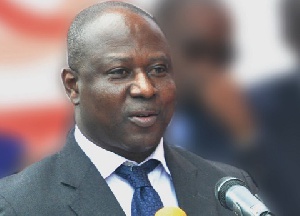 Dr Abdul-Nashiru Issahaku, Bank of Ghana Governor
Dr Abdul-Nashiru Issahaku, Bank of Ghana Governor
Opinions are divided over whether the current Bank of Ghana governor, Dr Abdul-Nashiru Issahaku, should be allowed to serve his term, following the electoral victory of the New Patriotic Party’s presidential candidate, Nana Addo Dankwa Akufo-Addo.
While the former Finance Minister and a Member of Parliament’s Finance Committee Dr Anthony Akoto Osei believes the governor of the central bank should voluntarily step down, the Chief Executive Officer of Dalex Finance and Leasing Company Limited, Kenneth Kwamena Thompson and Former President of the Ghana Bar Association, Mr. Sam Okudzeto have kicked against any move to negotiate the exit of a BoG governor.
Replacing the Central Bank boss, according to Mr Thompson, will have dire implications for the economy, as the incoming government will have to dole out huge sums of money as a payoff to the governor and is likely to affect investor confidence in the short term.
“For the purposes of proper governance, he should be allowed to serve his term. I don’t see the reason why the governor, who has been appointed and approved by all, cannot work with the new government. I think as a country we must go beyond the so-called precedence that was set. Let’s do the right thing as we look beyond the personality and look at the institution and see how actions impact on the institutions,” he told the B&FT.
“It is very sad because this whole debate that has been ignited, I believe, has to do with some individual’s personal interest. But Akufo-Addo the President-elect must allow the institutions to work which I think will be to his advantage as well,” he added.
Mr Thompson also slated the assertion that the current governor may not believe in the economic policies and the direction the new government may want to pursue. According to him, if the NPP government will fail, it will be their inability to implement sound and better economic policies but not the individual that heads the central bank.
“Look, if the NPP will fail, they will fail and that will not be because of the governor of the Bank of Ghana but it will be because they have bad economic policies. I think the argument has to do more with people’s personal interest than really what is good for the country, this shouldn’t be a big deal.”
Earlier in April this year, when the issue came up as to whether the governor must resign his post should there be a change of government, a Former President of the Ghana Bar Association, Mr Sam Okudzeto kicked against any move to negotiate the exit of a BoG governor.
“The law is aware of this, the day of appointment of a governor is not the same as the day of appointment of the government so we must allow the law,” he stressed.
According to him, no governor should be forced out of office whether through negotiations or unconstitutional means.
However, former Finance Minister and a Member of Parliament’s Finance Committee Dr. Anthony Akoto Osei reaffirmed his call that the governor of the central bank should voluntarily step down.
He maintained that even though the governor’s term is secured under the constitution, it would be prudent for him to step down as he feels the governor is strongly attached to the former government.
“If I were in his position, I will voluntarily step down considering his strongly political leaning to the outgoing government”.
According to him, the governor must be able to work as part of a team, emphasising that the relationship between a governor and a government must be cordial to allow both parties to work together.
Meanwhile, Ghana’s constitution clearly spells out the rules governing the tenure of the central bank’s governor.
According to the law, the four-year term of a governor of the central bank is protected and cannot be dismissed even by the president unless on stated grounds.
Article 183 (4) (d) of the 1992 constitution states that “he shall not be removed from office except on the same grounds and in the same manner as a Justice of the Superior Court of Judicature other than the Chief Justice, may be removed”.
The current governor of the central bank Dr Abdul-Nashiru Issahaku’s was appointed in April 2016 after the then governor, Dr Henry Kofi Wampah, stepped down from the Bank prior to his retirement.
Before his appointment as Governor, he was the Second Deputy Governor and Executive Board member with oversight responsibilities of nine departments including Economics, Statistics, Finance, Legal, Banking Supervision and Financial Stability.